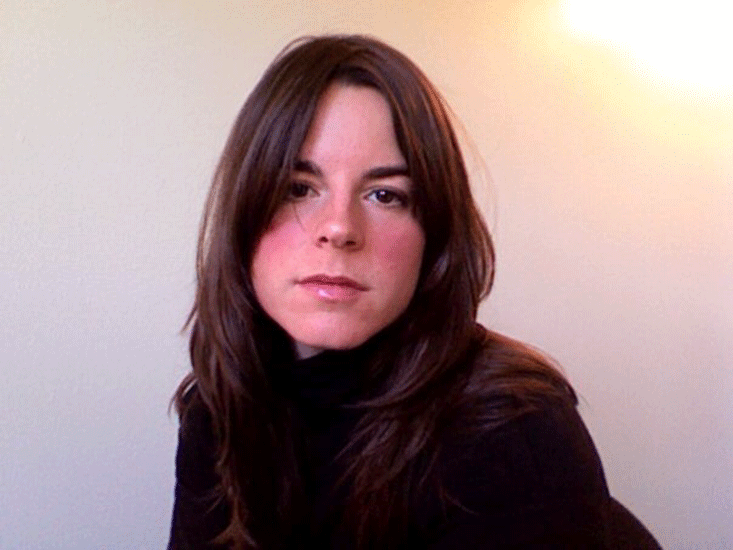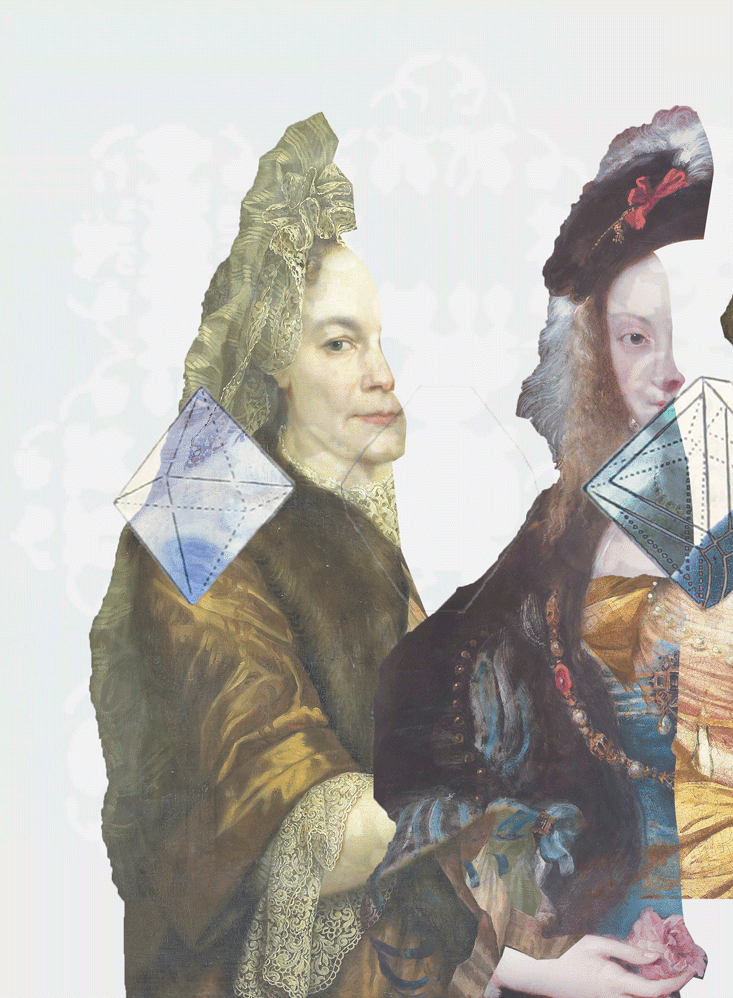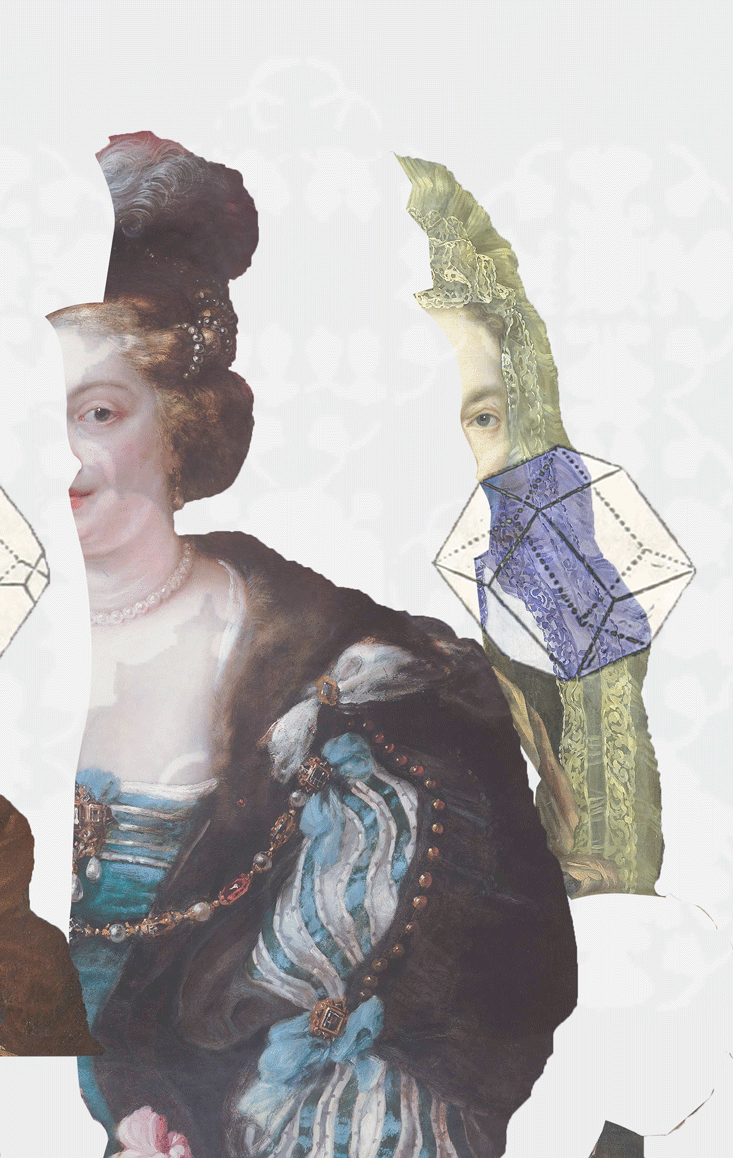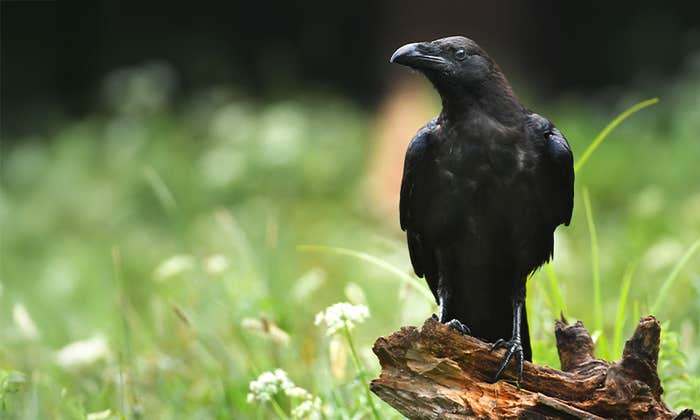In 2004, I spent many hours walking the dirt paths of the Driftless Area, an undulating region in the Midwest left untouched by glaciers from Earth’s ice ages. In some parts the cracked earth exhales a cool air generated by underground ice. It’s a reminder of history easy to forget—until the frigid air wends its way through subterranean rock and wraps around a wanderer’s ankles.
I’d recently moved over 1,000 miles away from my East Coast university, returning to Iowa, my home state, where my then-partner was teaching. I had just finished my coursework and exams, and I was moving on to my dissertation. When I’d started my program years before, I’d imagined spending my final years as a graduate student at a world-class library, sharing ideas and coffee with brilliant colleagues, working at the peak of my knowledge and confidence at some epicenter of higher education. Yet here I was instead, borrowing books from distant libraries, and roaming limestone bluffs with a rescue dog from Baraboo, Wisconsin. Technically I was searching for a dissertation topic. But privately I roamed those hills searching for something more—a reason to stay in philosophy.
A professor trying to woo me into his program leaned over and in a whisper propositioned me.

Early in my academic career I had started to find the climate of academic philosophy unwelcoming to women. No one in my department taught works by women philosophers; a mentor had openly doubted women’s ability to do philosophy. As one of the few women in the program, I was lonely. I believed women could make significant contributions to philosophy, but even so, I questioned whether philosophy was a place where they could thrive.
This began to change the year I arrived in Iowa. One afternoon I was reading an obscure monograph when a footnote led me to A Serious Proposal to the Ladies by Mary Astell, who lived from 1666 to 1731. I’d never read works by women philosophers who lived before the 20th century, assuming that since they didn’t show up in textbooks or in class discussions that they didn’t have anything unique or profound to say. Yet I was captivated by the title of Astell’s work. Here was a book personally addressed to women.
Reading A Serious Proposal, I was surprised to find that Astell offered complex arguments about the nature of mind and body, tackling some of the same issues of metaphysics and epistemology as René Descartes and John Locke. Yet her core message was simple: educate women so they can pursue personal happiness and contribute to society. I was amazed by Astell’s boldness and unapologetic ambition, how she willed into existence a new, heartening vision for women’s lives.
Today Astell is virtually unknown. You won’t find her ideas in most philosophy textbooks or course syllabi, and most history of philosophy scholars don’t know about her work. Anthony Kenny, who wrote the multivolume History of Western Philosophy, told me in an email that “Mary Astell is an interesting person,” although he had not read A Serious Proposal. “But can you honestly claim that her contribution to philosophy is on the same level as that of her contemporary John Locke?” he asked. Another acclaimed popular historian of philosophy told me the reason women philosophers didn’t figure in his book was his “aim was to explain the ideas of the most influential thinkers of the period—the people of whom today’s readers have heard—and none of those people were women.”
The histories of philosophy, written by men, relegated women’s concerns to the sidelines.
As I worked on my dissertation, I began to realize that part of the reason that philosophy lost Astell, and other brilliant women, has to do with how the history of philosophy is crafted and taught. The history of philosophy is not a comprehensive catalog of different theories, or a series of accidental events in human history. It’s an account of the development of the science of human reason as understood by a few 19th century historians, who focused on theories of knowledge. These histories of philosophy, written by men, relegated women’s concerns to the sidelines. I came to see the plight of women in philosophy in Astell’s story. And in my own.

As a young girl growing up in an industrial town in Iowa, my exposure to intellectual culture was spotty. But I was drawn to big questions, and some of the most prominent ones in my life were religious, circling around God and the purpose of life. My innate skepticism and curiosity were steady forces, and I kept my pastors busy with persistent questioning. In one of my earliest memories, I am perched on the edge of my bed, demanding God prove his existence by making me fly. My childhood was full of metaphysical longing, triggered by the melancholic clang of church bells at twilight and expansive starry nights interrupted by the bright lights of football games. The mall bookstore had a philosophy shelf mostly stacked with religious texts. I would sit cross-legged on the carpet, reading from the Tao Te Ching, the Bhagavad Gita, and Augustine’s Confessions, half comprehending but stirred. In high school, I had the opportunity to take classes at the local, regional university, where I read Camus, Voltaire, and Rousseau. I started to question my own religious commitments. I wanted to know ultimate reality, and if I couldn’t, I wanted to trace its borders, where the knowable and unknowable met. Philosophy had the power to prick and deflate the world as I knew it, which filled me with glee.
While at college on the East Coast, I took philosophy courses, focusing on early modern thinkers. Even though I’d abandoned my belief in religion, I appreciated the elegance and sophistication of the systems of Descartes, Leibniz, and Spinoza. To read them was both an intellectual and aesthetic experience. I was fascinated by the prospect of finding links between their philosophies and concepts we use today. By understanding their way of thinking, we could better know ourselves.
When I was offered a full scholarship to earn a Ph.D. in philosophy, my passion and professional selves aligned, and I followed the promise of self-fulfillment. Academic philosophy was a world that promised to make me into the person I had always imagined I’d become—authentic, driven by her own compass. It promised to fulfill my childhood dream of jumping headfirst into a life devoted to questioning. It promised a career that would make me an independent woman, relying on no one.
That there were few women in my graduate program didn’t bother me. I had always been somewhat of a tomboy, and took it as a point of pride that I got along with the guys. I knew that professional success would involve working mostly with men. Besides, I figured that a positive disposition and determination would help me endure any crusty misogynist, should I ever meet one in the academy. But after a few years in academic philosophy, I wasn’t feeling that promise anymore.
A female friend gave sexual favors to her mentor in exchange for recommendation letters.
Early in my academic life, I was lunching with two professors who were trying to woo me to join their Ph.D. program. When one of them got up to go to the restroom, the other leaned over to me and and in a whisper propositioned me. After that experience, I declined to enroll in the program. Still, I saw it as an isolated incident.
Not long after I started my Ph.D. program, I’d heard from some colleagues that a visiting professor recently left because some female graduate students complained he had sexually harassed them. Some of the professors seemed on edge around their female students, and one told me that department faculty could not meet with graduate students outside of office hours, a rule which seemed to apply only to the female students. I felt like an outcast when I heard stories of my male colleagues bonding with their mentors over beers, having dinner in each others’ homes, and sharing stories and jazz CDs.
Reaching out and forming basic connections with professors was fraught with anxiety, and my sense of isolation expanded. I was asked to write a recommendation for a professor who was up for tenure. When I described him as “a friend,” I was encouraged by another professor to replace it with something less personal so it wouldn’t be misconstrued by the administration as sexual. Another time, I bought a dozen ears of Iowa corn for a professor I admired who had lived in the Midwest and told me he missed it. I left them in the department refrigerator for him with a note, but afterward, I worried my gesture would be taken the wrong way.
One afternoon in a coffee shop, a female friend who studied philosophy at another university confessed to me that she gave sexual favors to her mentor in exchange for recommendation letters. She was talented and a feminist. It depressed me to think she felt she had to strip naked to secure a job in philosophy.
I grew quieter in my classes. I confessed to a professor whose seminar I was taking that I didn’t like how quiet I’d become—especially compared to my male classmates, who except for the one other quiet woman, were talkative. He kindly listened, but didn’t know what to say. In another class, a professor asked the students to consider that women’s underrepresentation in philosophy was due to biology.
While I grew dispirited with my professors’ responses, I began to notice they weren’t much concerned with the treatment of women in philosophy texts either. The sexist comments in the works of great philosophers were skipped over in discussion, almost as if they did not exist. We seemed to be treading water above the dark secret that philosophy has a long history of maligning women. It felt false and alienating not to talk about it.
And I realized I wanted to start talking about it. But there were no feminist philosophy courses in my program. I asked a faculty member about studying feminist philosophy, and he encouraged me to visit a workshop at another university across the river, where some female professors met a few times a semester to discuss feminist theory.
Mary Astell writes that if a woman’s husband is a “Block-head” then the wife should govern him.
Over the next couple years, I finished my courses, never once studying a woman philosopher. In graduate school, I relayed to a professor that a prospective graduate student was uncertain about enrolling in the program because she wanted a climate supportive of women, the professor informed me that the prospective graduate student “really doesn’t care about that sort of thing.” But she did. And so did I. Yet I couldn’t say either of these things, because I was afraid of losing favor with a professor who one day might write me a recommendation letter for a job.
I increasingly sought validation from my partner, who was further along in the graduate program than I was. The professors admired him because he was sharp and articulate. I was envious that they came up to him after discussions, praising his arguments. If he thought I belonged, then I guess I belonged. But the cost of his validation was confidence in my own judgment.
Some women left the program. Others continued on. I did, too. But I was tired of feeling lonely and managing the waves of self-doubt. I was tired of the small space I’d retreated into. I was tired of being quiet.

Astell wasn’t quiet. She was passionate and assertive. She didn’t like doing what girls were supposed to do. She loathed parties, fancy clothes and makeup. All of these things were unwanted distractions, keeping her from what she loved to do: think, read, and write. In a teenage poem, she writes, “O happy solitude, may I/ My time with thee, & some good books employ!” There isn’t evidence she was much interested in boys either, though she did take interest in the fact that they got a much better education than girls.
But her preferences were out of sync with her era. She was born in a coal-mining town in northern England. This was an age when women were not admitted to universities, because most people believed that their minds were too weak and that they were destined for housework. Normally girls her age and class were educated in domestic arts, but sometimes, if they were lucky, exceptions were made. Astell’s family was of the gentry class, whose members occasionally allowed girls to study more challenging subjects if time or money allowed. From ages 8 to 13, she was tutored by her brilliant uncle in philosophy, history, French and logic.
Tragedy struck when her father died. He had worked in the coal industry, but the mines had been running low and the family was in debt. She was 12 years old, and already faced with the fact that she wouldn’t have a dowry—a monumental problem for a young girl who wanted to spend her time contemplating. Without a dowry, she would probably have to marry someone less educated than her and so less likely to be sympathetic to marrying an eccentric young woman who could spend hours in her books. Then a year later, her uncle died and her tutorials ended. He left his entire library to her, perhaps hoping to throw a wrinkle in tradition. In the following years, Astell continued her studies on her own when she could. Then at age 21, she suffered another tragedy when her mother died.
Without her mother to anchor her, she was upset and confused about how to proceed. In a poem, she says that the world doesn’t have a place for an ambitious woman or a woman who wants to be a Christian missionary. “But ah my Sex denies me this,” she wrote.
There was another option. In Astell’s day, it was uncommon for a never-married single woman to make a living on her own. But the exception was London, where independent women lived in certain neighborhoods without too much stigma. Most of these women found respectable jobs as servants, governesses, and schoolteachers. Astell, however, wasn’t interested in those jobs. She wanted to write, and it was a golden moment to be a writer. The city was experiencing a burst of unprecedented literary flourishing. There were over 150 bookshops in the city to feed the increasingly voracious appetite of London’s literate class, who bought novels, travels books, essays, newspapers, and pamphlets. Although there were no women writing philosophy books, she may have taken inspiration from a famous woman, Aphra Behn, who made a living writing poetry, fiction, and plays.
And so in 1688, she scraped together all the money she had—enough to live modestly for one year—sewed it in the inside of her clothing to hide it from highway robbers, and boarded a stagecoach for a two week journey south to London.
After one year, things weren’t going well. She had almost run out of money and was selling some of her clothes for income. She was still holding out to make a living as a writer, but she needed a patron. And so she pulled together a collection of her poems written on stained pieces of vellum, and sent them to a well-known patron of the arts, Archbishop William Sancroft of Canterbury. He decided to help her out, and soon after, she started work on her first book, A Serious Proposal to the Ladies, her first major philosophical statement.

In Iowa, I devoured A Serious Proposal. As I read her words, calling women to study philosophy, I felt visible again. It was validating for a work of philosophy to acknowledge something so mundane: women need a place to think.
Astell’s argument rests on a background rich in metaphysics and epistemology. It echoes the writings of Descartes, whom she acknowledges in a discussion of the nature of human reason, and Locke, with whom she appears to be arguing about the mind-body union. Astell is a mind-body dualist, believing each are separate. We can’t know how these two substances interact—that insight exceeds the limits of human understanding. We can, though, cultivate interactions among mind and body. When the mind (reason) governs the body (passions), we can access the true properties of things. Our dual nature becomes clear to us, and we can grasp the existence of God, whose wisdom and goodness ensures that nothing in creation is done in vain.
God gave humans reason and bodies to serve a purpose, which includes regulating the passions, Astell wrote. Once a person is in control of her desires, she can fulfill her Christian duties and earn salvation. So it’s incumbent upon each person to perform a “minute inquiry into our own [nature]” to discover their talents and how they can be best expressed. She is then on a path to a happy life and creating social harmony.
But Astell says the problem is that women haven’t been allowed to cultivate their reason and think for themselves. The “Tyranny shall I say, or superior Force of Men, keeps women from Acting in the World.” Her solution is to carve out a space away from the negative influence of men where women can gain self-esteem and exercise their minds. This space includes the establishment of an all-women’s academy, where women study the latest theories in philosophy to hone their minds and improve their souls. She knew they were up to the task, rejecting the common notion that women were intellectually inferior to men. “The Incapacity, if there be any, is acquired not natural,” she said.
I felt I had an ally in Astell. I loved how she wasn’t afraid to demand more for other women. And what language! “If all Men are born free, how is it that all Women are born slaves?” she asked. Astell herself never married, choosing instead to live as a single woman her entire life. She was adamant that a woman has a right to judge for herself who she is and which roles she is best suited for. She insisted in a few passages on a wife’s subordination to her husband, and she was opposed to divorce. But she doesn’t believe all women are destined for marriage, and warns them to consider the job carefully before they choose it. In A Serious Proposal, she writes that if a woman’s husband is a “Block-head” then the wife should govern him.
For her forcefulness, Astell knew there would be backlash. Yet that’s the risk a woman takes when she steps into a space considered to be the natural province of men, “I know not how the Men will resent it, to have their enclosure broke down, and Women invited to taste of that tree of knowledge they have so long unjustly monopoliz’d.”
But she didn’t let fear of resentment stop her. “An ingenious Woman is no Prodigy to be star’d on, for you have it in your power to inform the World, that you can every one of you be so, if you please your selves.” When I read these words, I heard her saying to women: come with me among the abstractions and syllogisms. You belong here.
And so I stayed in Iowa, writing my dissertation on Astell and two other early modern women philosophers, Damaris Cudworth Masham and Catherine Trotter Cockburn, devoted to improving the condition of women. I wrote about the common thread in their thought, how they agreed that bias kept women in a state of inferiority, and their insistence that women needed to be educated so they could perform their duties to God, society, and themselves. I discovered these remarkable women were the natural precursors to the feminist philosophies of Mary Wollstonecraft and John Stuart Mill. It was extraordinary to realize women writers had been laying the foundation of feminist philosophy since at least the Renaissance.
I reveled in my research and after a couple years of hard work, I had a date to defend my dissertation. The day before my defense, I flew from Iowa to the East Coast. A couple hours after my plane landed, I got an email from one of my readers, telling me that we needed to cancel the defense. He’d reread the dissertation, and changed his mind; he said I wasn’t ready. I was crestfallen. Then I was angry. I walked two miles from my hotel to the department and spoke to one of the other members of my committee, a more senior member of the faculty than my first reader. He disagreed with my first reader, and insisted the defense go on.
The next day I arrived at my defense exhausted from a night of little sleep and feeling demoralized. I sat in a small room facing five committee members, four men and a woman. One of the male committee members said my work was an achievement, being the first dissertation in the history of the department devoted to women philosophers. It was a heartening preface, but my defense went by in a blur; I was just trying to endure the whole experience. After questioning, and a few minutes of deliberation, my committee gave my dissertation a pass, asking me to make a few minor revisions. I was awarded my Ph.D. a couple months later.
I got a job at a college in the Midwest and taught courses on women philosophers and feminism. Later I moved to New York City and taught similar classes at a small university. As time wore on, though, I once again grew weary of being one of the few women in philosophy departments, and of trying to persuade other professional philosophers to take early modern women philosophers seriously. One of Astell’s messages in A Serious Proposal is women sometimes do their best work outside of realms dominated by men who think little of women. With my teaching contract about to expire, and a new job hunt in philosophy looming before me, I enrolled in a master’s degree in journalism. I loved the reporting, writing, and camaraderie of my fellow students and professors. In 2014, ten years after Astell helped me find my path in Iowa, I walked out of my career in philosophy without a regret.
Regan Penaluna is an editor at large at Nautilus.
References
Astell, M., The Christian Religion, As Profess’d by a Daughter of the Church of England. In a Letter to the Right Honourable, T.L. C.I., London: R. Wilkin, 1705.
Astell, Astell: Political Writings, P. Springborg (ed.), Cambridge: Cambridge University Press, 1996.
Astell, A Serious Proposal to the Ladies. Parts I and II, P. Springborg (ed.), Ontario: Broadview Literary Texts, 2002.
Astell, Letters Concerning the Love of God, E. D. Taylor and M. New (ed.), Aldershot: Ashgate, 2005.
Broad, Jacqueline., 2002a, Women Philosophers of the Seventeenth Century, Cambridge: Cambridge University Press.
Broad, Jacqueline. 2015. The Philosophy of Mary Astell: An Early Modern Theory of Virtue, Cambridge University Press
Ruth Perry, 1986, The Celebrated Mary Astell: An Early English Feminist, Cambridge: Cambridge University Press.






























